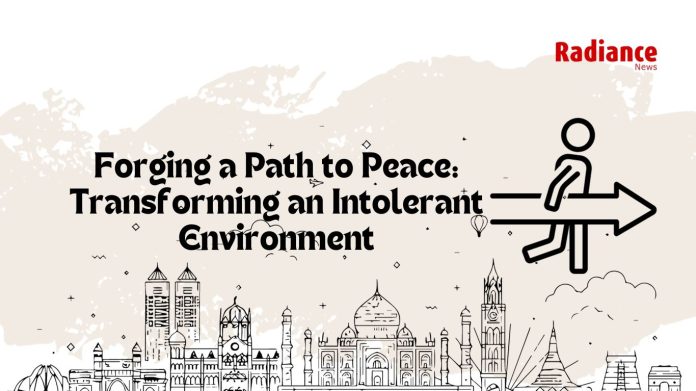
Religious intolerance is spreading as rapidly as wildfire in multi-cultural and multi-religious India where people belonging to differences have been living in co-existence with each other for centuries. But certain radical organisations have been actively involved in disturbing peace in the country, with the government not doing enough to curb the menace of intolerance. To save ourselves from this fire, paving the way to peace is the need of the hour. In an interaction, Ph.D. scholar Sania Mariam and BBN News Editor Sheikh Khalil Farhad talk about how we can restore peace and communal harmony and save India from the ills of intolerance.
 Sheikh Khaleel Farhaad, News Editor, Program Producer, and Anchor at BBN News
Sheikh Khaleel Farhaad, News Editor, Program Producer, and Anchor at BBN News
In the past nine years, India has witnessed a rapid surge in the environment of intolerance, unlike anything seen in the past. Perhaps our country stands proudly as one of the fastest-growing nations globally. However, the atmosphere of intolerance has deeply divided the bonds of fraternity among the people of this country. Recent attacks by extremist organizations against minorities and hate-filled speeches that have emerged at an alarming rate all indicate that India’s sense of fraternity is in peril and requires urgent attention and action.
To address this, it is very important that all political and social figures unify on one front and work together to transform the environment of intolerance. The most pressing issue is establishing a road to peace.
It is worth recalling that a year after the Bharatiya Janata Party came to power in India, i.e. in 2015, a group of prominent personalities from various fields, including scholars, scientists, and renowned artists returned their national awards as a protest against the growing intolerance in the country. This act showed that they could not freely express their opinion in an environment of hate. Even after the passage of eight years, the country’s situation has remained unchanged. The climate of intolerance is becoming worse by the day.
It should be noted that the most important thing required for the success or development of any nation, community, or society is peace and security, and it is very sorrowful to say that both peace and security are lacking in our country. We witness attacks in the name of religion even in public spaces like trains and in broad daylight.
Progressive nations prioritize establishing peace and creating a society where values such as morality, tolerance, justice, the protection of human rights, and mutual respect thrive to extinguish strife. Our opposition parties and peace-loving people should come forward with this agenda in the upcoming elections.
The media should also shoulder responsibility for eradicating intolerance from society; for this, it must come together on a single platform with civic society to promote peace.
Hence, if we are truly peace lovers, we must first try hard to remove all the obstacles to peace, by rejecting all those elements of society that promote hatred and extremism in society.
In such challenging times, Islam has provided a way to peace. As an Islamic society, while fulfilling the demands of justice, we can set an example of a peaceful society because Islam teaches us peace and justice. For all Muslims, this is the right time to present Islam as a solution for countering hate and intolerance. Islam has always advocated against hate and intolerant environments.
 Sania Mariam, Ph.D. Scholar, Victoria, Australia
Sania Mariam, Ph.D. Scholar, Victoria, Australia
To transform an intolerant environment, two primary approaches stand out: challenging ideology and promoting political awareness in daily life.
Ideological Approach: The concept of Hindu nationalism, whether in part or in its entirety, should be confronted with an alternative ideology. This alternative could be secular or chosen by the people themselves. The prevailing idea of Hindu nationalism, as advocated by the leading political party and the RSS, intentionally marginalizes minority groups. Therefore, it’s crucial to present a counter-ideology.
Promoting Political Awareness in Daily Life: Everyday life should be imbued with political awareness, as demonstrated during the CAA Protest.
Every person from all walks of life, including farmers, minorities, students, etc., should be very sound in their political awareness to assert their rights in their daily lives.
For instance, some people have demanded separate seating for vegetarians. It’s very simple: if you want to sit, then sit; and if you don’t want to sit, then don’t. However, it’s important not to institutionalize the segregated compartments under the name of inclusivity. Everyday actions need to be challenged. This is a small example of how an ideology can influence everyday life, leading to unwanted divisions between different groups.
This principle extends not only to students but also to businesses. Recent academic research highlights that businesses accommodating diverse communities not only protect their interests related to pride, safety, and beliefs but also discourage potential conflicts. When businesses serve both Muslim and Hindu customers, they foster unity and mutual protection. Conversely, if businesses promote exclusivity, it may inadvertently lead to competition, and in cases of violence, harm to each other’s establishments can occur. Therefore, businesses should aim for greater integration. Civil society organizations have a vital role to play in promoting this integration.




